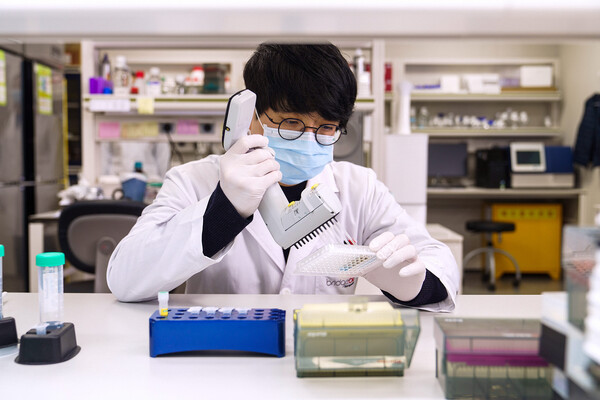Bridge Biotherapeutics’ clinical trial of its lead pipeline failed to meet statistical significance, prompting the company to revise its development strategy. The company has indicated plans to continue working on the pipeline through sub-analyses and indication changes.
Specifically, the company said it is conducting preclinical trials to explore the potential of repurposing its existing idiopathic pulmonary fibrosis (IPF) treatment as an anti-cancer drug. However, some industry experts have expressed skepticism regarding this strategy.

On Monday, Bridge Biotherapeutics revealed in a public filing that its global phase 2 clinical trial of the IPF drug candidate BBT-877 failed to show a statistically significant improvement in the primary endpoint, which was changes in forced vital capacity (FVC). The trial, involving 129 IPF patients in the U.S. and Australia, showed no statistical difference in FVC at week 24 between the placebo and drug arms.
In response, the company released a sub-analysis of BBT-877 and outlined a strategy to shift the indication to ovarian cancer. As part of this new direction, Bridge Biotherapeutics completed preclinical efficacy trials in ovarian cancer in collaboration with Pusan National University College of Medicine and published the results. It is also working with Emory University in the U.S. to develop BBT-877 for lung cancer patients who have developed resistance to immunotherapies.
BBT-877 is a small molecule that exerts anti-inflammatory and anti-sclerotic effects by inhibiting autotaxin, thereby reducing the production of lysophosphatidic acid (LPA). Initial studies suggest that LPA, produced by autotaxin, exacerbates the tumor microenvironment by facilitating cancer cell migration and invasion while inhibiting immune cell infiltration. Furthermore, LPA has been linked to increased resistance to platinum-based anticancer drugs, particularly in ovarian and colorectal cancer cells.
Based on this mechanism, Bridge Biotherapeutics is considering the development of BBT-877 for recurrent ovarian cancer that is resistant to existing cancer therapies. Additionally, the company is exploring its potential as a treatment for lung cancer patients resistant to immunotherapies like Keytruda.
Currently, PARP inhibitors such as Zejula and Lynparza are used as maintenance therapies for ovarian cancer after platinum-based chemotherapy. Moreover, the recent approval of AbbVie’s mirvetuximab soravtansine (Elahere) in the U.S. and Europe is shifting the treatment paradigm from platinum-based chemotherapy to antibody-drug conjugates (ADCs).
For lung cancer, chemotherapy regimens like pemetrexed and platinum are recommended for non-small cell lung cancer (NSCLC), with active clinical trials exploring Keytruda combination therapies. However, there are no clinically proven combination therapies beyond conventional chemotherapy agents.
Despite these developments, some anti-cancer drug development experts remain skeptical of Bridge Biotherapeutics’ approach. Currently, only one global company, Switzerland-based iOnctura, is conducting clinical trials with an autotaxin inhibitor, having begun phase 1 trials of IOA-289 for pancreatic cancer in 2021.
“For a substance to be developed as an anti-cancer drug, its mechanism should be a key driver of cancer, but the mechanism of action of BBT-877 raises doubts about its potential as an anti-cancer treatment,” said an industry insider. Another source added, “Developing an anti-cancer drug targeting ovarian cancer using this mechanism is challenging, and the autotaxin inhibition approach itself is considered outdated.”
Bridge Biotherapeutics was designated as an administrative issue on Kosdaq last month. The Korea Exchange reviews a company’s eligibility for continued listing the following year if its loss from continuing operations exceeds 50% of its equity for two out of three years.
The failure of BBT-877 to meet clinical trial expectations has also placed Bridge Biotherapeutics in a difficult financial position. As of last year, the company had cash equivalents of 21.3 billion won. The company’s future development will require funding, and market attention is now focused on whether it will be removed from the administrative issue designation.
Related articles
- Bridge Biotherapeutics’ lung drug BBT-877 flops in phase 2 trial
- Bridge Biotherapeutics to present IPF drug candidate at JP Morgan Healthcare Conference
- Ildong Pharm launches Ofev generic as Korea's ILD market competition heats up
- Why CEO Lee is pivoting Bridge Biotherapeutics toward digital assets
- Bridge Bio to wind down new drug biz after acquisition by US investor Parataxsis

